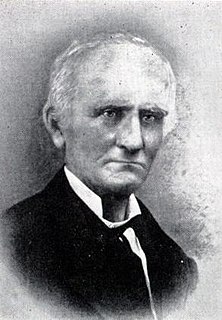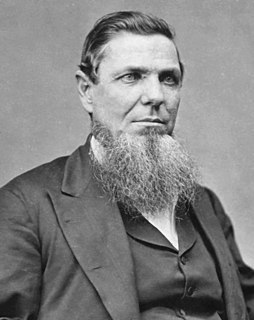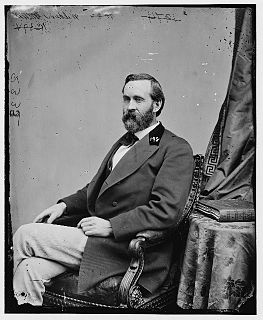
William Harris Crawford was an American politician and judge during the early 19th century. He served as United States Secretary of War and United States Secretary of the Treasury before running for president in the 1824 election.

In the context of the American Civil War (1861–65), the border states were slave states that did not declare a secession from the Union and did not join the Confederacy. To their north they bordered free states of the Union and to their south they bordered Confederate slave states. Of the 34 U.S. states in 1861, nineteen were free states and fifteen were slave states. Two slave states never declared a secession or adopted an ordinance: Delaware and Maryland. Four others did not declare secession until after the Battle of Fort Sumter and were briefly considered to be border states: Arkansas, North Carolina, Tennessee and Virginia—after this, they were less frequently called "border states". Also included as a border state during the war is West Virginia, which was formed from 50 counties of Virginia and became a new state in the Union in 1863.

Jonathan Worth was the 39th governor of the U.S. state of North Carolina from 1865 to 1868, during the early years of Reconstruction.

William Alexander Graham was a United States Senator from North Carolina from 1840 to 1843, a Senator later in the Confederate States Senate from 1864 to 1865, the 30th Governor of North Carolina from 1845 to 1849 and U.S. Secretary of the Navy from 1850 to 1852, under President Millard Fillmore. He was the Whig Party nominee for vice-president in 1852 on a ticket with General Winfield Scott.

Asa Biggs was a North Carolina politician who held a number of positions. He was a U.S. Representative, a U.S. Senator, and federal judge.

George Walker Crawford was a licensed attorney turned politician from Columbia County, Georgia. Crawford was appointed attorney general for the state in 1827, by Governor John Forsyth, serving in that capacity until 1831. Crawford also served five years in the General Assembly's lower house as a representative of Richmond County on a platform of states' rights.

Herschel Vespasian Johnson was an American politician. He was the 41st Governor of Georgia from 1853 to 1857 and the vice presidential nominee of the Douglas wing of the Democratic Party in the 1860 U.S. presidential election. He also served as one of Georgia's Confederate States senators.

Benjamin Fitzpatrick was the 11th Governor of the U.S. state of Alabama and a United States Senator from that state. He was a Democrat.

Andrew Jackson Hamilton was a United States politician during the third quarter of the 19th century. He was a lawyer, state representative, military governor of Texas, as well as the 11th Governor of Texas during Reconstruction.

Alfred Holt Colquitt was an American lawyer, preacher, soldier, 49th Governor of Georgia (1877–1882) and two-term U.S. Senator from Georgia (1883–1894), dying in office. He also served as an officer in the Confederate States Army during the American Civil War, reaching the rank of brigadier general.

Francis Wilkinson Pickens was a political Democrat and Governor of South Carolina when that state became the first to secede from the U.S.A.
The Dean of the United States Senate is an informal term for the Senator with the longest continuous service, regardless of party affiliation. This is not an official position within the Senate, although customarily the longest-serving member of the majority party serves as President pro tempore.

Henry Cornelius Burnett was an American politician who served as a Confederate States Senator from Kentucky from 1862 to 1865. From 1855 to 1861, Burnett served four terms in the United States House of Representatives. A lawyer by profession, Burnett had held only one public office—circuit court clerk—before being elected to Congress. He represented Kentucky's 1st congressional district immediately prior to the Civil War. This district contained the entire Jackson Purchase region of the state, which was more sympathetic to the Confederate cause than any other area of Kentucky. Burnett promised the voters of his district that he would have President Abraham Lincoln arraigned for treason. Unionist newspaper editor George D. Prentice described Burnett as "a big, burly, loud-mouthed fellow who is forever raising points of order and objections, to embarrass the Republicans in the House".
Anderson Mitchell was a Congressional Representative from North Carolina; born on a farm near Milton, North Carolina, June 13, 1800; attended Bingham’s School, Orange County, North Carolina, and was graduated from the University of North Carolina at Chapel Hill in 1821; studied law; was admitted to the bar and commenced practice in Morganton, North Carolina, in 1830; moved to Jefferson, North Carolina, in 1831; court clerk of the superior court of Ashe County; moved to Wilkesboro, North Carolina, in 1835, and resumed the practice of law; elected as a Whig to the Twenty-seventh Congress to fill the vacancy caused by the death of Lewis Williams and served from April 27, 1842, to March 3, 1843; unsuccessful candidate for reelection in 1842 to the Twenty-eighth Congress; member of the State house of commons 1852-1854; elected to the State senate in 1860; delegate to the State convention of May 20, 1861, that passed the Ordinance of Secession, and voted against secession; was appointed judge of the superior court by Provisional Governor Holden in September 1865, subsequently elected and reelected, and served until June 30, 1875, when he resigned; died in Statesville, North Carolina, December 24, 1876; interment in the Presbyterian Cemetery.

James Mullins was an American politician who represented Tennessee's 4th congressional district in the United States House of Representatives from 1867 to 1869. He also served a single term in the Tennessee House of Representatives (1865–1867). Described as a "fierce fanatic of the Republican Party," Mullins supported the initiatives of Governor William G. Brownlow in the state legislature, most notably leading efforts to ratify the Fourteenth Amendment.

Martin Jenkins Crawford was an antebellum U.S. Representative and a representative to the Provisional Confederate Congress during the American Civil War from the state of Georgia.
At the end of the American Civil War, the devastation and disruption in the state of Georgia were dramatic. Wartime damage, the inability to maintain a labor force without slavery, and miserable weather had a disastrous effect on agricultural production. The state's chief cash crop, cotton, fell from a high of more than 700,000 bales in 1860 to less than 50,000 in 1865, while harvests of corn and wheat were also meager. The state government subsidized construction of numerous new railroad lines. White farmers turned to cotton as a cash crop, often using commercial fertilizers to make up for the poor soils they owned. The coastal rice plantations never recovered from the war.

Madison Miner Walden was a Civil War officer, teacher, publisher, farmer, the Lieutenant Governor of Iowa, and a one-term Republican U.S. Representative from Iowa's 4th congressional district, then located in southeastern Iowa.
James Thomas Harrison was an American politician who served as a Deputy from Mississippi to the Provisional Congress of the Confederate States from 1861 to 1862.





























